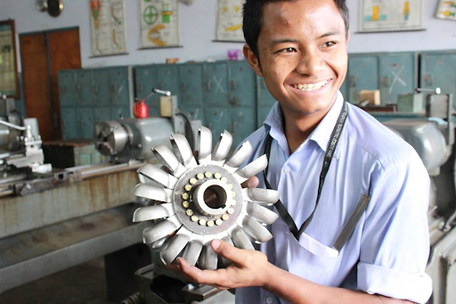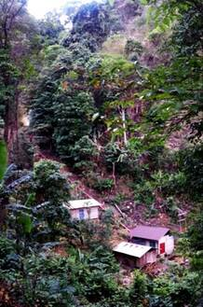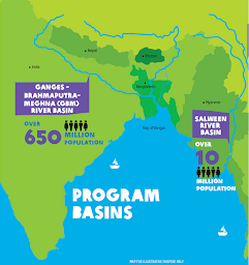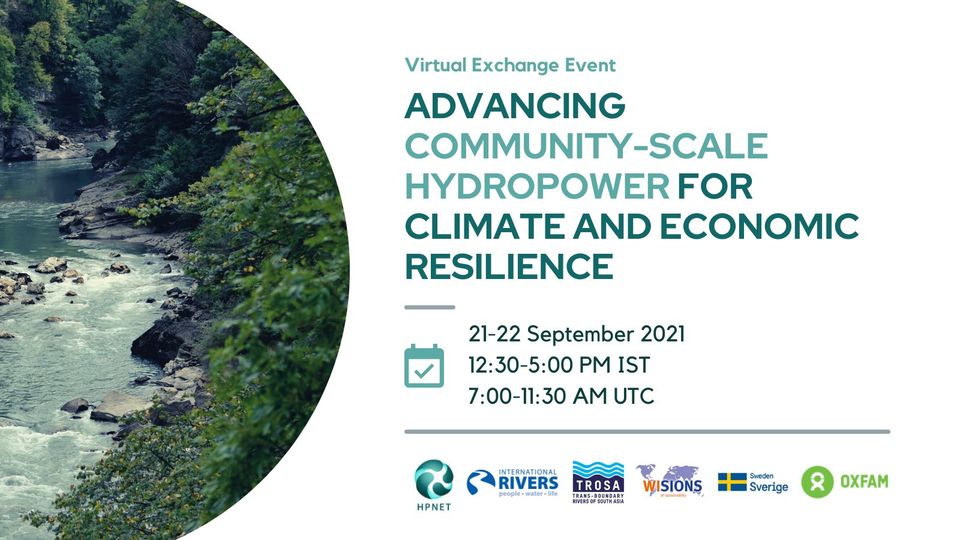By Hydro Empowerment Network (HPNET)
Originally published on HPNet’s website
The river basins of the Ganges, Brahmaputra, Meghna, and Salween (GBMS) Rivers are endowed with rich natural resources, exceptional biodiversity, and vibrant indigenous cultures. Yet social and environmental well-being continue to be undermined by large hydro development, as decision makers seek economic prosperity and economic recovery, in the stark context of a global pandemic.
However, community-scale hydropower offers an alternative path that provides modern energy services, while strengthening the local social, economic, and ecological resources of this unique region. The region is fortunate to have experienced local practitioners who have been advancing pico hydropower as a nature-based, community-centric solution for clean and sustainable energy access.


HPNET has engaged with local practitioners in the region since 2013, in partnership with International Rivers, Nagaland Empowerment of People thru Energy Development (NEPeD), and the Meghalaya Basin Development Authority (MBDA), and the Meghalaya State Council for Science and Technology for different activities. We have mapped stakeholders, visited sites, and held dialogues on opportunities, challenges, and regional best practices, based on a 4-step approach to knowledge exchange. Since 2019 the approach has been refined into a knowledge-to-impact initiative called Social Enterprise for Energy, Ecological and Economic Development (SEEED). SEEED is based on 40-years of experiential hindsight in the global South on what makes community hydro systems sustainable and deliver optimal results. The SEEED Accelerator was launched this quarter, enabling practitioners to customize proven sustainability mechanisms to local contexts, unlocking their potential to generate climate resilient socio-economic co-benefits.

A key component of the SEEED Accelerator is to establish peer-to-peer and multi-stakeholder cohorts, targeting different geographic regions. We’re excited to launch the first SEEED cohort — focusing on the basin regions of the Ganges, Brahmaputra, Meghna, and Salween Rivers (GBMS) in partnership with International Rivers, supported by TROSA and the WISIONS initiative at the Wuppertal Institute of Climate, Environment and Energy. The partnership offers three learning opportunities for field-based practitioners in the GBMS basins — namely group capacity building, individual customized coaching, and peer-to-peer exchange. Read on to learn more!
Cohort Capacity Building
The GBMS SEEED cohort kicked off earlier this month with a 3-day virtual capacity building event, offering technical capacity building for small-scale hydro practitioners working directly with communities in the GBMS regions (i.e. Bangladesh, Bhutan, India, Myanmar, Nepal or Thailand). The course was conducted by Mr. Ramasubramanian (a.k.a Rams) Vaidhyanathan, focusing on site assessment and the basics of system design for systems < 10 kW. Days 1 and 3 were conducted online, and Day 2 included optional field assessment work. The group of 20+ participants are continuing to solidify their understanding of key topics while also learning about each other’s work through group emails facilitated by Rams. Remaining committed to field-based practitioners, the HPNET Secretariat will continue to facilitate learning exchange among the cohort beyond the HPNET – Intl Rivers partnership period.



Customized Individual Coaching
All participants who completed the 3-day group training have been invited to receive follow-up, customized capacity building. This allows helping to resolve each participant’s specific technical issues in their ongoing initiatives and to improve their technical processes to prevent issues. This type of support is important for both advanced practitioners (e.g. NE India practitioners scaling up their work to hundreds of implementations this year), as well as beginning level practitioners (e.g. civil society organizations in Myanmar who are conducting their very first feasibility studies). It is also an opportunity for the HPNET Secretariat to continue refining its approach to the SEEED Accelerator, better responding to and strategizing context-specific needs for future cohorts.
Peer-to-Peer Exchange Event
An exchange event was held on 21-22 September, 2021. Building upon exchanges conducted in 2016, 2018, and 2019, this 2-day virtual event aimed to provide opportunities for South-South, peer-to-peer exchange and multi-stakeholder dialogue. Day 1 focused on sharing from field-based practitioners from across the Asia Pacific, while Day 2 will focus on multi-stakeholder dialogue on country and state specific challenges and opportunities in the GBMS regions. See here for details on how to participate!
Agenda:
| DAY 2 AGENDA – EXCHANGE EVENT: ADVANCING COMMUNITY-SCALE HYDROPOWER FOR CLIMATE AND ECONOMIC RESILIENCE DAY 2: MULTI-ACTOR DIALOGUE EXCHANGE DATE: WEDNESDAY, SEPTEMBER 22, 2021 TIME*: 12:30 – 5:00 PM INDIA STANDARD TIME (IST) / 7:00-11:30 AM (UTC) Join us for Day 2 of the virtual exchange event on advancing small-scale hydropower (< 1MW) for climate and economic resilience. Building on the practitioner exchange of Day 1, Day 2 will focus on interactive, participant driven, multi-actor dialogue for regions of the Ganga, Brahmaputra, Meghna, and Salween River (GBMS) basins (i.e. Bangladesh, Bhutan, India, Myanmar, Nepal, and Thailand). The following details the timing, topics, and process for Day 2. OPEN SPACE FACILITATION The half-day online event will utilize Open Space Technology (OST) facilitation. OST as defined by leading facilitator Chris Corrigan is: A simple, powerful way to catalyze effective working conversations and truly inviting organizations — to thrive in times of swirling change.A methodological tool that enables self-organizing groups of all sizes to deal with hugely complex issues in a very short period of time.A powerful group process that supports positive transformation in organizations, increases productivity, inspires creative solutions, improves communication and enhances collaboration.The most effective process for organizations and communities to identify critical issues, voice to their passions and concerns, learn from each other, and, when appropriate, take collective responsibility for finding solutions. Four Principles and One Law Open Space operates under four principles and one law. The four principles are: 1. Whoever comes are the right people. 2. Whatever happens is the only thing that could have happened. 3. When it starts is the right time. 4. When it’s over it’s over. The Law is known as the Law of Two Feet: “If you find yourself in a situation where you are not contributing or learning, move somewhere where you can.” The four principles and the law work to create a powerful event motivated by the passion and bounded by the responsibility of the participants. Day 2 is designed to utilize OST facilitation to catalyze dialogue on the theme of solutions for advancing community-scale hydropower for the climate and economic resilience in the GBMS basins. Opening Session 12:30 – 1 PM IST, Welcome & Overview The half-day event will commence with opening remarks, introductions, and event overview.Welcome and Participant Intros, Nalori Chakma, International Rivers Overview of Community Hydro in GBMS Regions, “How We Got Here”, and OST Orientation, Dipti Vaghela, Hydro Empowerment Network Creating Open Space 1 – 1:30 PM IST, Open Space Technology (OST) Setup The event will move into establishing the key components of OST. Collaborative Agenda Setting Short breakMarketplace Wall Multi-Actor Dialogue – Round 1 1:30 – 2:45 PM IST, Open Space Round 1 Using the OST principles, the 1st round of participant-led interactive dialogue will take place.Convene Round 1Report Back Break for Informal Networking, 2:45 – 3:15 PM ISTMulti-Actor Dialogue – Round 2 3:15 – 4:30 PM IST, Open Space Round 2 Using the OST principles, the 2nd round of participant-led interactive dialogue will take place.Convene Round 2Report Back Closing Session 4:30 – 5 PM IST, Summary and Next Steps The event will close with a collective prioritization of the emerging insight and open thoughts by participants on follow up steps. Prioritization of Ways ForwardClosing Circle |
Join us for a virtual exchange event to advance small-scale hydropower (< 1MW) for climate and economic resilience!
DAY 1: PRACTITIONER EXCHANGE
DATE: TUESDAY, SEPTEMBER 21, 2021
TIME*: 12:30 – 5:00 PM INDIA STANDARD TIME (IST) / 7:00-11:30 AM (UTC)
REGISTER HERE
*You can use this time conversion table to convert from IST to your time.
HPNET is excited to host a virtual exchange event from 21-22 September, 2021, in partnership with International Rivers, supported by TROSA, funded by the Government of Sweden and WISIONS. Read more about our partnership with International Rivers here.
Day 1 provides an opportunity to hear from locally-rooted practitioners who work directly with micro hydro communities across the Asia Pacific. As shown in the agenda below, the half-day event is divided into two parts, each consisting of two parallel sessions. Each session will include a 20-30 minute Q&A period, during which participants are encouraged to ask questions. Our flexible platform will enable participants to move between parallel sessions, should they choose to do so. If you haven’t already registered, be sure to do so at the link above.
The following agenda details the timing, topics, panelists and moderators for Day 1.
Opening Session, 12:30 – 1 PM India Standard Time (IST)
Welcome & Overview
The half-day event will commence with opening remarks and an agenda overview.
- Welcome, Nalori Chakma, International Rivers
- Key Note, Augustus Suting, Meghalaya Basin Development Authority (MBDA) and Meghalaya State Council of Science & Technology (MSCST)
- SEEED Accelerator and Event Overview, Dipti Vaghela, Hydro Empowerment Network
| Session 1: Panel A, 1 – 2:30 PM IST Technical Reliability & Capacity Building Moderator: Joe Butchers In this panel we will hear from practitioners who have long established local manufacturing and capacity building centers. We will learn about their latest developments and dialogue on technical standards and job creation. Malaysia: Alice Lasimbang, CREATEPhilippines: Benazir Bacala, CREATechIndia: Yanger Imchen, NEPeDIndonesia: Gerhard Fischer, HYCOM | Session 1: Panel B, 1 – 2:30 PM IST Utilization (PEU, eCook, Interconnection) Moderator: Vishwa Bhushan Amatya In this panel, moderated by an expert with over 35 years of experience in community hydropower, practitioners versed in utilization will summarize their insight on productive end uses (PEU), electric cooking, and grid interconnection. Nepal: Manjari Shrestha, Practical Action NepalIndonesia: Pradygdha Jati, IBEKANepal: Biraj Gautam, PEEDANepal: Jiwan Kumar Mallik, AEPC RERL |
Break for Informal Networking, 2:30 – 3:00 PM IST
| Session 2: Panel A, 3:00 – 4:30 PM IST Social and Environmental Approaches Moderator: Nalori Chakma This panel will feature path breaking practitioners who have innovated community governance, nature-based solutions, integration with indigenous practices, and/or women-centric approaches — all critical aspects of sustainable community hydropower. Philippines: Jun Porferio Jabla, YamogPhilippines: Jade Angngalao, SIBATIndia: Anuraj Sharma, Gram VikasMalaysia: Ayu Abdullah, Energy Action Partners | Session 2: Panel B, 3:00 – 4:30 PM IST Enterprise, Finance, & Integrated Planning Moderator: Dipti Vaghela This panel will overview social enterprise models, such as asset-only models, community utilities and cooperatives. The dialogue will provide insight on local and national planning, as well a private sector view on access to finance. Nepal: Satish Gautam, AEPC RERLPakistan: Sherzad Ali Khan, AKDN & AKRSPIndonesia: Sentanu Hindrakusuma, AHBNepal: Suman Pradhan, NYSE |
Closing Session, 4:30 – 5 PM IST
Summary and Ways Forward
To conclude the day, event organizers will summarize the day’s events and highlight points of interest. Participants will be advised of relevant, upcoming events and activities to stay tuned for.

